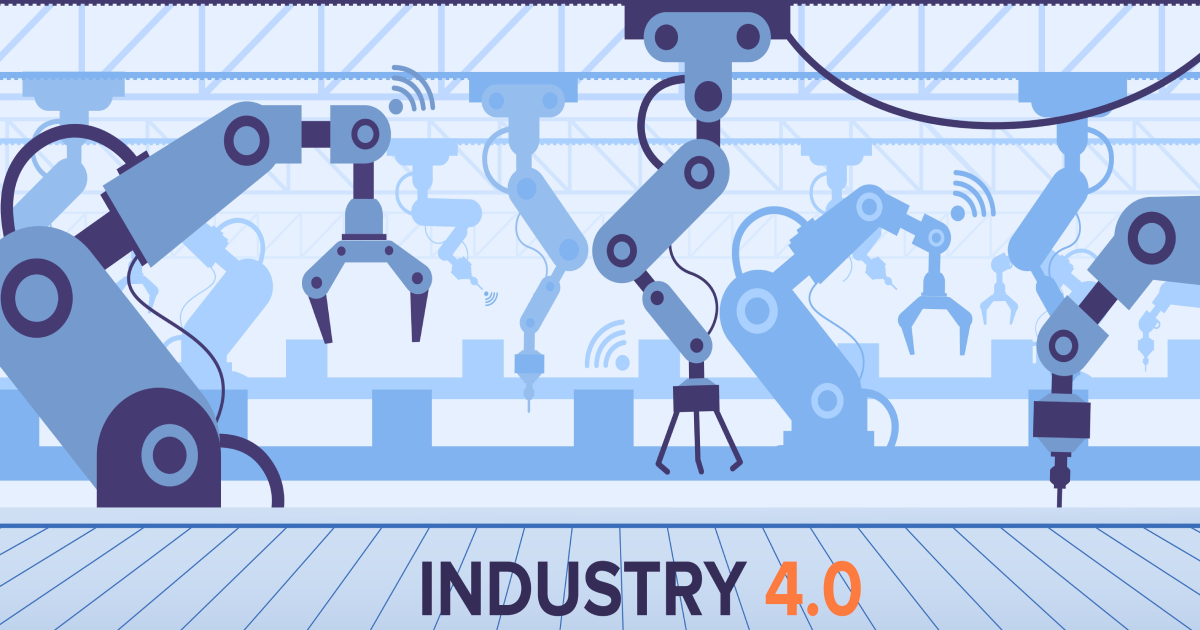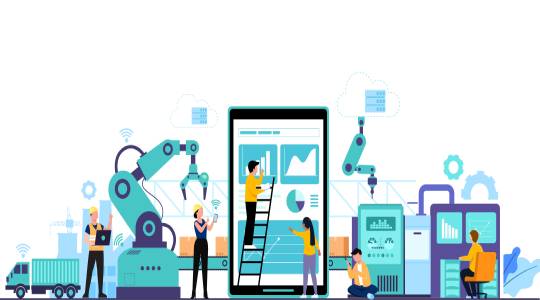5 Key Challenges of Companies in Starting Industry 4.0 journey (And How to Address Those)
Industry 4.0 has ushered in a new and smarter way of manufacturing goods. The manufacturing industry has come a long way from mechanization and mass production to the current automation and cyber-physical connected systems.
Industry 4.0 connects a network of machines with each other through the internet. These machines communicate with each other and share information that enables companies to optimize their operations and accelerate the time-to-market.
It helps companies optimize their processes, improve decision-making, and enhance productivity. Elements such as predictive maintenance and automation have made the processes more efficient and transparent and have reduced unprecedented downtimes. It’s also easy for the workforce to monitor the processes from anywhere and minimize errors.
However, the potential of Industry 4.0 was truly tested during the pandemic when companies had to keep pace with the increasing demands for goods and disruption in the supply chain. They could predict demands, streamline operations, and ensure that the goods were dispatched to the market sooner.
In fact, McKinsey’s research shows that companies prioritize digital transformation to become future-ready. 93% plan to use technologies to strengthen their supply chain, while 90% plan to hire talent for digitization.
Five challenges of starting industry 4.0 and how to address them
Although Industry 4.0 has the potential to transform manufacturing, there are a few challenges that companies face while starting their journey. Let’s look at the top 5 challenges and ways to tackle them.
Use of legacy systems
One of the misconceptions about Industry 4.0 has to do with legacy systems. As most processes and workflows are built around legacy systems, companies fear that they may need to completely replace the legacy systems and adding new systems would be time-consuming as well as expensive. They believe that integration and bridging data gaps would require a lot of effort and could impact business continuity.
Solution: The good news is that companies don’t have to replace their existing legacy systems completely. They can add new technology layers on top of the existing systems. This will enable seamless integration between the systems and streamline the process of importing the data to a common framework. They can also easily add capabilities built on technologies such as AI, automation, and data analytics over the existing systems to make them smart with intelligent alerts, bringing predictive characteristics, and remote monitoring & control based on insights from data.
Challenges in the ROI estimation process
Industry 4.0 is a huge step for companies as it requires some levels of overhaul with their systems and processes. Hence, it is important to understand the value they would derive from the proposed transformation. It is important to estimate the expected ROI before starting the program. Unfortunately, ROI calculation is not a straightforward process. Digital transformation is not limited to quantifying sales or revenue. The objective is to show the company the value of investing in digital technologies (examples could be showing how automation improves productivity or AI improves decision-making). Hence, companies need to measure the value generated and use those results while computing the ROI.
Solution: To accurately estimate the ROI, companies should start small. They can measure the improvements and business values delivered at the pilot stage and use that to calculate the ROI. This will enable them to evaluate the potential of transformation more objectively and decide on a further course of action.
Lack of preparedness
Industry 4.0 is more than a buzzword. It is about re-thinking how companies operate and produce goods. Companies often get overwhelmed by the critical decisions they need to make to embark on this journey. This leads to decision paralysis as they cannot decide where to begin.
Solution: The first step is to conduct the readiness assessment. Readiness assessment will help companies analyze their maturity level, determine their business objectives and priorities, allocate budgets, prioritize areas of transformation, and bridge the gaps between existing and new technologies & capabilities. It will prepare them to build a strong strategy and roadmap for the transformation.
Inability to utilize data being generated
Data is the fulcrum of Industry 4.0. So, if companies want to leverage the full potential of Industry 4.0, they need to have quality data with reliability. In many companies, data is available in a fragmented form, or the volume of good quality data is less. Sometimes there’s so much data that the analysts cannot make any sense of it. All these pose a challenge for companies that want to transform into an organization with data-driven decision-making practice.
Solution: Companies can start by consolidating all the data together and share them with all stakeholders in a secure and reliable way. The data can be consumed by enterprise applications, AI & ML based analytics engines, enterprise visualization tools, and rules engines. This ecosystem will ensure secure and consistent utilization of data generated by Industry 4.0 use case implementation and perform complex calculations, predict future outcomes, and bring agility and flexibility to the process.
Security
Companies still hesitate to shift to Industry 4.0 because of the fear of security breaches. Industry 4.0 is an ecosystem of interconnected devices and systems. All it takes is a vulnerability for a potential hacker to disrupt the entire operation.
Solution: Companies can no longer use a reactive approach to solving security challenges. They need to be a step ahead to identify potential vulnerabilities and take preemptive measures to stop them from impacting the whole system. One way will be to build a robust security system that uses AI-based security monitoring algorithms. This will help companies with early detection of any suspicious activity, analyze them, and mitigate them on time.
Conclusion
Embarking on the journey of Industry 4.0 is not hard. However, companies should be aware of the challenges and know how to overcome them to optimize their value.
At Delpheon, we help companies to collect, process, and analyze data to transform business. Our IoT application enablement platform along with our consultation offerings enable manufacturers to quickly realize their objectives and tackle these challenges.
Even if Industry 4.0 does not feature as your top business goal right now, we would recommend you start investing in gathering data and storage, so that it can be utilized in the future and make you future ready.
To know more about Delpheon, contact us.



